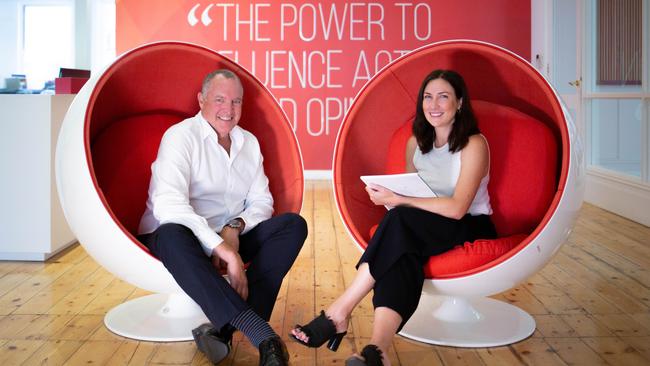How to talk to your boss about your future
Experts say preparation is key to confident workplace conversations.
Careers
Don't miss out on the headlines from Careers. Followed categories will be added to My News.
Aussie workers would rather resign than have awkward conversations with their boss. Exclusive insights by Allianz Australia reveal two in five workers (43 per cent) do not feel comfortable initiating difficult conversations with their employer.
Workers will even resign to avoid an uncomfortable discussion, says mental health expert Dr Mark Cross.
“They think it’s easier to leave and find another job (than talk to their boss),” Cross says. “But that’s not a great technique. The problems will just follow you to the next job.”

Asking for a pay rise is the most difficult conversation topic, with the Allianz research showing 68 per cent of workers are uncomfortable making the request. More than half (55 per cent) dislike asking for a promotion, while 43 per cent feel uneasy raising bullying and harassment issues.
Experts say preparation is key to confident workplace conversations and warn avoiding difficult topics can lead to strained relationships and poor mental health.
Stay positive
SEEK resident psychologist Sabina Read says workers need to approach uncomfortable discussions with an open and positive mindset.
“Often our fears, our concerns (and) our worst-case scenarios are founded on false narratives,” she says.
“The outcome is often better, and the conversation is less awkward, than we anticipate.”
Ahead of any discussion, Read says workers should briefly detail their concerns in an email to their boss. “We often don’t make (our intentions) clear at the outset,” she says.
“We might say we want to have a conversation but we don’t tell them what it’s about so, when it starts, they feel hijacked.”
Using “I” statements, that focus on the worker’s needs or feelings, will be more effective than accusatory “you” statements, Read says.
Timing can also play a part in a conversation’s success.
“Don’t come to a difficult conversation feeling flustered or rushed or like you are squeezing it in,” Read says. “This is important. A difficult conversation matters.
Rehearse the conversation
Allianz personal injury chief general manager Julie Mitchell advises workers formulate a list of discussion points and then role play the conversation with family or friends.
She says conversations should always finish with an arrangement to follow-up at a later time – some issues may not be resolved immediately.
“Make sure you leave the conversation knowing what’s going to happen next,” Mitchell says. “It could be that you’re going to come back (for further discussion) in two weeks or that one of you needs to do a few things first and then come back.”
To encourage open workplace conversations, Allianz has developed Crucial Conversation Toolkits, a free, downloadable resource with tips for effective discussions.
“Whether it be about flexible working arrangements, annual leave or even a promotion, these topics are going to surface, and they need to be prioritised,’’ Mitchell says.
“The steady rise in psychological injury claims highlights that this needs to be a focus, yet our research has shown that the majority of employees have not had training on how to conduct these conversations.”

Actions speak louder than words for Zoe Drummond, who believes the key to succeeding at difficult work conversations is having the evidence to support your request.
Drummond has worked as an office manager for Hughes PR for the past five years but when extra help was recently needed to produce video and graphic design content, she jumped in to lend a hand.
After displaying her capabilities, Drummond approached her boss, managing director Tim
Hughes, about moving into the role full-time.
“I definitely opted to take action before I had any conversation (about changing roles),’’ says Drummond.
“I wanted to be able to say, ‘Look what I have already achieved’, because that made me feel way more comfortable going in and talking to Tim.’’
The conversation went exceptionally well and Drummond is now transitioning to a content producer role.
She says a strong team culture within the workplace helped build her confidence around the discussion.
“It’s such a nurturing environment here,’’ she says.
“I felt comfortable enough to say, `I’m done with this (administration) part of my role, I feel
I’ve outgrown it and I feel there’s an opportunity for me to do (graphic design and videography) instead.’’
Tips for crucial conversations
- Write a list of the topics you want to discuss and think about how you’re going to discuss them.
- Know that it’s OK to feel nervous. Consider speaking to a support person before, during or after your crucial conversation.
- Clearly share your expectations for the meeting upfront, ensuring you’re working towards a positive outcome.
- Approach the meeting with solutions in mind, while being open to negotiating to ensure the solution is suitable for all involved.
- Follow up on the conversation in writing to ensure you and your manager are aligned on the discussion and agree on the solution that has been reached.
Source: Allianz Australia


